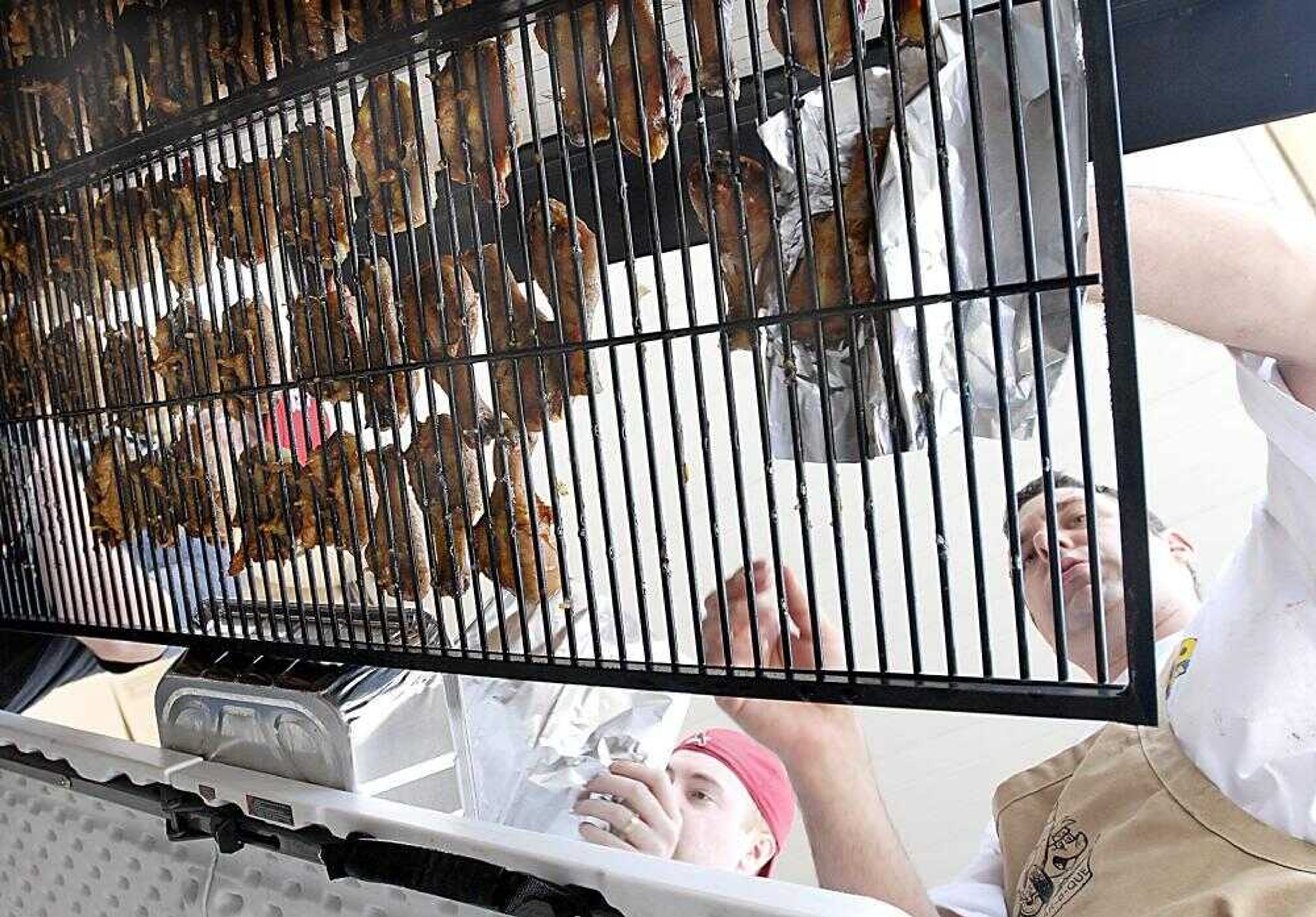Dozens of student judges learn finer points of barbecue
Barbecue judges, remember: Samples don't have to be small. In fact, they shouldn't be. "Judges are not birds," said Ed Roith, a "professor of barbecue" for the Kansas City Barbeque Society and a founding member of the group. "Don't take one little nibble. You can't tell if it has flavor, moisture or texture that way."...
Barbecue judges, remember: Samples don't have to be small.
In fact, they shouldn't be.
"Judges are not birds," said Ed Roith, a "professor of barbecue" for the Kansas City Barbeque Society and a founding member of the group. "Don't take one little nibble. You can't tell if it has flavor, moisture or texture that way."
Roith instructed 107 people how to judge chicken, ribs, pork and beef brisket at the Eagles Club in Cape Girardeau on Saturday. He repeatedly stressed proper cooking.
"Always be on guard for overcooking," he said. "Work it around in your mouth for a while. If it turns to mush, the meat's been overcooked."
Though a sample may have good flavor, he said, evaluating texture is important and disregarding it is not fair to the cook who has taken the time to properly cook the meat.
"You must understand, as a judge, what goes into the cooking process," he said. "Understand what cooks are using."
Student judges followed the double-blind system used in competition. Contestants are given a number that's used when they turn in entries. Their entry is then renumbered by a Kansas City Barbeque Society representative. The table captains present an opened Syrofoam box to six judges who evaluate its appearance. Then table captains hand out plates and scoring cards that are numbered by the judges and placed on their plates. That's when meat is pulled to test for overcooking or undercooking. Next, judges take the bite and record a score.
Roith also explain the different judging criteria for judging organizations like the International Barbeque Cookers Association in Texas; Memphis in May, the oldest; and the Kansas City Barbeque Society, the largest. For instance, using aluminum foil would disqualify a contestent in a Kansas City Barbeque Society contest. A contestant at an International Barbeque Cookers Association event, on the other hand, wouldn't place anything in a Styrofoam tray for fear of being disqualified.
A judge who claims ribs as her favorite, Gala Franklin of Broseley, Mo., volunteered her time preparing Styrofoam trays. She works in the billing department at a Poplar Bluff, Mo., hospital and puts in long hours early in the week so she can judge barbecue.
"It's a passion. Me and my husband, James Duncan, are busy from March 1 to the end of October with barbecue," she said.
Franklin has 18 upcoming contests to judge and has already judged 16 events this year. "The friendship and camaraderie are amazing," she said.
While students were learning, cook Ryan Eftink of Cape Girardeau and two helpers prepared 150 pounds of chicken thighs, nine beef briskets, nine pork shoulders and 45 slabs of ribs.
Eftink, who learned to cook from his mother and grandmother, has been doing it since he was 6. He and his brother-in-law, Craig Crawford of St. Louis, do a couple of barbecue contests a year on the "Smoking Brothers" team.
While cooking is not relaxing, "it's worth it to hear people say, 'That's the best food I ever ate,'" Eftink said.
Representatives from barbecue contests in Malden, Mo., Owensboro. Ky., Cape Girardeau and Pulaski, Tenn., attended in hopes of recruiting judges for their upcoming events. "Barbecue has exploded," Roith told his students. "We need help from people like you."
The Kansas City Barbeque Society is the world's largest organization of barbecue and grilling enthusiasts with 200 contests nationwide annually.
Saturday's judging school took 26 volunteers from Kentucky, Illinois and Missouri to run.
"I'd do it again in a heartbeat," said organizer Connie Hanner.
cpagano@semissourian.com
335-6611, extension 133
Connect with the Southeast Missourian Newsroom:
For corrections to this story or other insights for the editor, click here. To submit a letter to the editor, click here. To learn about the Southeast Missourian’s AI Policy, click here.










